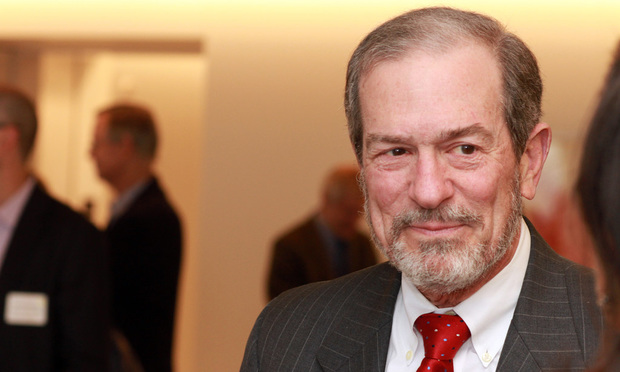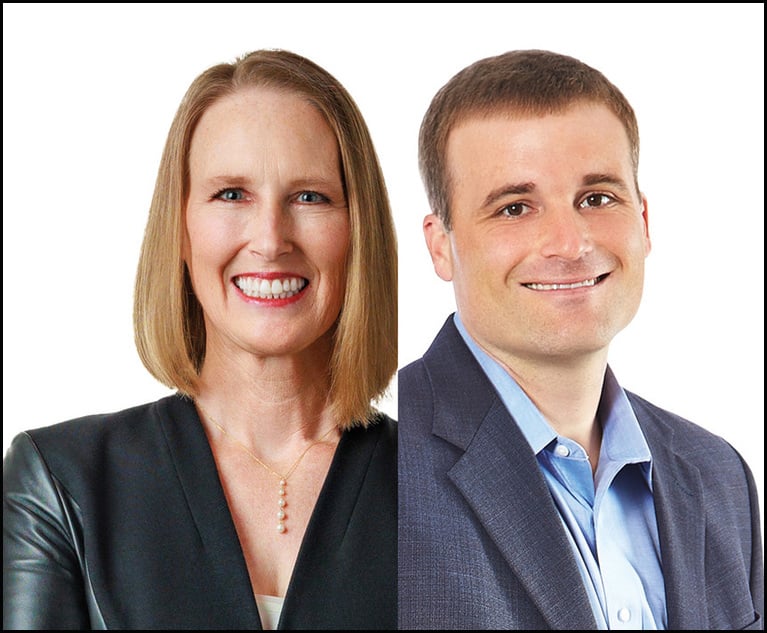Lifetime Achievement: John Fleming
"One thing that has not changed about my mentoring of newer lawyers is that I continue to learn more from them than they do from me."
June 19, 2019 at 02:00 PM
5 minute read
 John Fleming, Eversheds Sutherland, Atlanta (Photo: John Disney/ALM)
John Fleming, Eversheds Sutherland, Atlanta (Photo: John Disney/ALM)
For a litigator, John Fleming has garnered two reputations that are hard to beat: “Bet the company” and “Bet my life.”
Fleming's work across 40-plus years at Sutherland Asbill & Brennan (now Eversheds Sutherland) has given him those opportunities. On the business side, Fleming tried jury cases for corporate clients in courts across the nation, including Ford and Dow Chemical and argued numerous state and federal appeals.
From 1980 to 1992, he also represented death row inmate Andrew Legare in postconviction proceedings. He won reversals of the death sentence by the U.S. Supreme Court and by the Georgia Supreme Court and eventually won a life sentence before a jury (and Court TV) in Madison, Georgia, trial court. The client was released for time served.
Fleming has headed the firm's litigation practice, served on the executive committee and is now the firm's full-time pro bono partner. In that role, Fleming led a team of lawyers challenging the government's family separation policies; worked on one of the largest labor trafficking cases in U.S. history; started another case for a death penalty defendant in Georgia; and is leading a major class action to protect medically fragile children from losing their skilled nursing care.
How should one best manage clients' expectations in so-called bet the company cases, including how to consider settlement offers?
A company, of course, should not bet itself unless it absolutely has to. But often that bet is placed by the adversary, and the company has to respond. When the stakes are very high, early, intense and continuous evaluation of the range of likely outcomes is essential. Mock juries, focus groups and other evaluation tools can be critical. Choosing an effective mediator at an early stage is a sign of wisdom, not weakness. At that point, realistic budgets by both sides for the cost of the litigation can help bridge gaps, get the case settled and leave the client with a nice pile of chips.
You have served on your firm's executive committee. What misconception do lawyers at big firms have about how firms are managed?
Some lawyers may have the misimpression that big firm management is myopically focused on short-term numbers and individual financial performance. My experience was that management spent a lot of time considering how to enhance client service and to build cooperative, team-based approaches that benefit clients and the firm over time, even at the cost of some short-term dollars.
As you've mentored lawyers over the years, how have their primary challenges stayed the same or changed?
The primary challenge for a lawyer in private practice has always been to do the best possible job for the client—to solve the legal problem in the most effective and efficient manner. That hasn't changed. The challenge of maintaining a healthy work/life balance has always been there, too. But that challenge has changed in nature, with partnership no longer a sure reward for hard work and a clean nose, with lots of other opportunities for talented lawyers, with the economics of the practice at a more stressful level and with technology moving at warp speed in both work and life. One thing that has not changed about my mentoring of newer lawyers is that I continue to learn more from them than they do from me.
As the firm's pro bono partner, what factors do you consider when determining how lawyers should donate their legal services? Should firms focus on donating lawyer time to clients who need representation or should they focus on supporting efforts to fix underlying causes of societal problems?
I consider first what the lawyer taking on the pro bono work is passionate about. We all do better at and get more out of something we want to do. And that means some contribute time to compelling direct representations, like asylum-seekers, domestic violence victims or death penalty defendants, and some work together with other lawyers and nonprofit groups to seek to effect meaningful policy change for marginalized groups. There is no shortage of matters in either category. Business development is not an issue in the pro bono world.
What improvement in the practice of law would you like to see resolved in 10 years?
I would love to see Georgia and all other states achieve access to civil justice for everyone. There are promising initiatives underway all over the country: using technology to provide services in remote areas, permitting help in appropriate situations from legal professionals who are not lawyers, expansion of pro bono and low bono work by lawyers, lawyer assistance at scale to pro se litigants and more. Wealth and income gaps are greatly exacerbated by the access to justice gap. Every person deserves a just result when his or her rights are at issue in our justice system.
This content has been archived. It is available through our partners, LexisNexis® and Bloomberg Law.
To view this content, please continue to their sites.
Not a Lexis Subscriber?
Subscribe Now
Not a Bloomberg Law Subscriber?
Subscribe Now
NOT FOR REPRINT
© 2025 ALM Global, LLC, All Rights Reserved. Request academic re-use from www.copyright.com. All other uses, submit a request to [email protected]. For more information visit Asset & Logo Licensing.
You Might Like
View All
On The Move: Energy Infrastructure Pro Joins Moore & Van Allen, Adams & Reese Changes Atlanta Leadership
6 minute read


Trending Stories
- 1'It's Not Going to Be Pretty': PayPal, Capital One Face Novel Class Actions Over 'Poaching' Commissions Owed Influencers
- 211th Circuit Rejects Trump's Emergency Request as DOJ Prepares to Release Special Counsel's Final Report
- 3Supreme Court Takes Up Challenge to ACA Task Force
- 4'Tragedy of Unspeakable Proportions:' Could Edison, DWP, Face Lawsuits Over LA Wildfires?
- 5Meta Pulls Plug on DEI Programs
Who Got The Work
Michael G. Bongiorno, Andrew Scott Dulberg and Elizabeth E. Driscoll from Wilmer Cutler Pickering Hale and Dorr have stepped in to represent Symbotic Inc., an A.I.-enabled technology platform that focuses on increasing supply chain efficiency, and other defendants in a pending shareholder derivative lawsuit. The case, filed Oct. 2 in Massachusetts District Court by the Brown Law Firm on behalf of Stephen Austen, accuses certain officers and directors of misleading investors in regard to Symbotic's potential for margin growth by failing to disclose that the company was not equipped to timely deploy its systems or manage expenses through project delays. The case, assigned to U.S. District Judge Nathaniel M. Gorton, is 1:24-cv-12522, Austen v. Cohen et al.
Who Got The Work
Edmund Polubinski and Marie Killmond of Davis Polk & Wardwell have entered appearances for data platform software development company MongoDB and other defendants in a pending shareholder derivative lawsuit. The action, filed Oct. 7 in New York Southern District Court by the Brown Law Firm, accuses the company's directors and/or officers of falsely expressing confidence in the company’s restructuring of its sales incentive plan and downplaying the severity of decreases in its upfront commitments. The case is 1:24-cv-07594, Roy v. Ittycheria et al.
Who Got The Work
Amy O. Bruchs and Kurt F. Ellison of Michael Best & Friedrich have entered appearances for Epic Systems Corp. in a pending employment discrimination lawsuit. The suit was filed Sept. 7 in Wisconsin Western District Court by Levine Eisberner LLC and Siri & Glimstad on behalf of a project manager who claims that he was wrongfully terminated after applying for a religious exemption to the defendant's COVID-19 vaccine mandate. The case, assigned to U.S. Magistrate Judge Anita Marie Boor, is 3:24-cv-00630, Secker, Nathan v. Epic Systems Corporation.
Who Got The Work
David X. Sullivan, Thomas J. Finn and Gregory A. Hall from McCarter & English have entered appearances for Sunrun Installation Services in a pending civil rights lawsuit. The complaint was filed Sept. 4 in Connecticut District Court by attorney Robert M. Berke on behalf of former employee George Edward Steins, who was arrested and charged with employing an unregistered home improvement salesperson. The complaint alleges that had Sunrun informed the Connecticut Department of Consumer Protection that the plaintiff's employment had ended in 2017 and that he no longer held Sunrun's home improvement contractor license, he would not have been hit with charges, which were dismissed in May 2024. The case, assigned to U.S. District Judge Jeffrey A. Meyer, is 3:24-cv-01423, Steins v. Sunrun, Inc. et al.
Who Got The Work
Greenberg Traurig shareholder Joshua L. Raskin has entered an appearance for boohoo.com UK Ltd. in a pending patent infringement lawsuit. The suit, filed Sept. 3 in Texas Eastern District Court by Rozier Hardt McDonough on behalf of Alto Dynamics, asserts five patents related to an online shopping platform. The case, assigned to U.S. District Judge Rodney Gilstrap, is 2:24-cv-00719, Alto Dynamics, LLC v. boohoo.com UK Limited.
Featured Firms
Law Offices of Gary Martin Hays & Associates, P.C.
(470) 294-1674
Law Offices of Mark E. Salomone
(857) 444-6468
Smith & Hassler
(713) 739-1250






